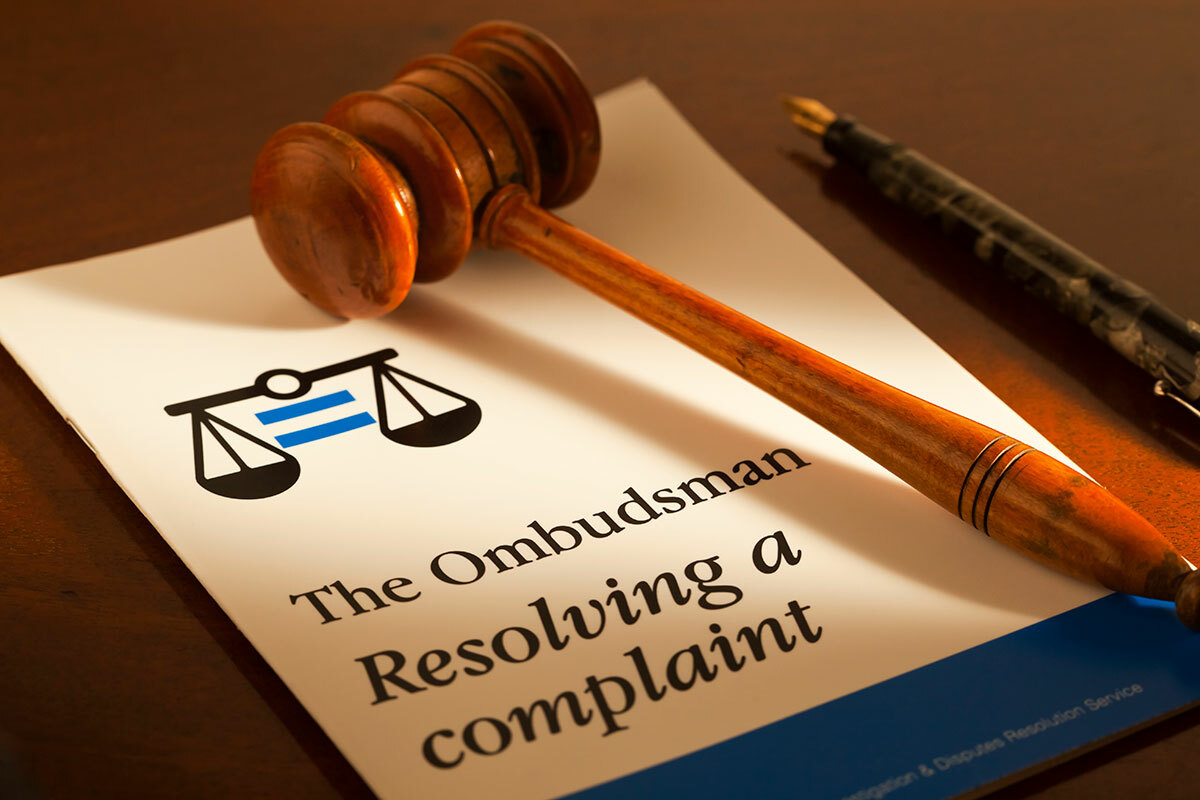You are viewing 1 of your 1 free articles
Spotlight on data: poor record-keeping ‘ubiquitous’ in sector and causing ‘daily detriment’ to residents
Poor data and record-keeping is “ubiquitous” in the sector and causing daily detriment to residents, according to the Housing Ombudsman’s latest Spotlight report.
Spotlight on: Knowledge and Information Management, which looks not only at record-keeping but also at how information is managed and used, revealed that only 7% of respondents to the watchdog’s call for evidence reported having no issues with accessing and using data.
It also revealed that two-thirds of the cases the ombudsman upholds have “some issue or other” with knowledge and information management.
The report highlights the significant negative impacts this can have on residents, particularly around vulnerabilities when landlords either do not record the data or fail to use it properly.
One disabled woman was left without a suitable toilet for more than a year, while another resident lived with disrepair for four years. One man lost 14 days of annual leave because of appointment failings by his landlord.
Richard Blakeway, the housing ombudsman, said: “At Grenfell, crucial fire safety data was lost because the landlord believed it was held on its server rather than an individual device. At Rochdale Boroughwide Housing, key information was stored on individual computers and emails lost when new software was introduced.
“While the consequences of these events were extreme, our latest Spotlight report demonstrates that poor knowledge and information management is routine. It is causing daily detriment to residents. This damages the sector’s reputation and erodes trust with residents.”
Mr Blakeway said poor data and record-keeping is “ubiquitous” and what can seem like a minor administrative error can have a “profound human and organisational impact”.
Investigations found that information mismanagement contributes to financial detriment, loss of heating and hot water, or residents being exposed to fire and other safety risks.
“Too frequently residents do not receive a service appropriately tailored to their needs because disabilities have not been recorded,” Mr Blakeway said.
He said it is “alarming” that sometimes it is only when the watchdog intervenes that data failings are being acknowledged and addressed, months or years after the landlord was made aware.
The spotlight investigation found that issues with making appointments are “systemic” for the sector, as are claims about ‘refusal of access’, often alongside little or no evidence.
One woman was noted as refusing access because her landlord ignored the need to plan appointments in advance because her children were autistic and could not have unexpected visitors.
Investigation findings
The report is based on cases determined in the year up to 31 March 2022, a review of the impact that information issues had on the ombudsman’s ability to progress cases, and where it had to issue a complaint-handling failure order (CHFO) because of an information-driven failure to progress a complaint.
It also spoke to landlord staff, particularly complaint-handlers, and its residents’ panel.
Over the year it reviewed, 191 cases dealt either with direct complaints about data and information management by landlords, or where it was a key issue in the complaint. The ombudsman made 242 orders and 147 recommendations in those cases.
In the 38 cases where the complaint was directly about knowledge and information management, it made 39 findings and found maladministration in 51% of those.
The watchdog made four maladministration findings for Lambeth Council and three for Clarion for complaints directly about information and data management.
For the remaining 153 cases, it made 186 findings and found 66% maladministration.
Where record-keeping was identified as a key issue within the handling of the complaint, the ombudsman made seven findings of maladministration for Notting Hill Genesis (NHG) and six for L&Q.
According to the report, in 2022-23 the ombudsman had to issue further chasers for information on 42% of the requests for complaint evidence that it made.
When it had to chase for paperwork, it took an average of another further 19 working days to return the paperwork necessary, with one landlord taking 234 working days to respond with it.
In the past two years, the ombudsman has issued 10 CHFOs where it has either been unable to get the appropriate evidence from the landlord to investigate, or the landlord has failed to provide evidence of compliance with its orders because of failings in the landlord’s information management.
During its call for evidence on knowledge and information management, 56% of respondents said they were having issues accessing or being provided with records in order to respond to complaints.
More than 80% of those said that it impacts their ability to fully address complaints, 77% of respondents said it impacted their ability to meet complaint-handling timeframes.
Complaints about the repairs service were the most affected by data access issues – 88% of 195 who cited repairs being affected said it was the service area that was the most problematic. This was followed by damp and mould, and then leaks.
More than half (57%) of respondents said problems accessing data were down to databases not synchronising.
“Databases failing to synchronise affected all types of landlords, but it was noticeable that a higher proportion of respondents from medium and large landlords reported issues – 45% and 47% respectively, compared to smaller landlords where only 22% of respondents said it was an issue,” according to the report.
This may be because smaller landlords do not have automated synchronisation processes and instead rely on double manual data entry, the ombudsman said.
Other reported issues included systems not being “fit for purpose”, staff not being trained on the importance of accurate record-keeping, and multiple systems being used for the same purpose, often because of mergers.
“Overall, 93% of responses to our call for evidence indicated problems with accessing and using data to some degree,” the ombudsman said.
Landlords, with two or more ombudsman findings, where the complaint was about information and data management
| Landlord | Total findings | Maladministration findings | Homes | Maladministration rate | Per 10k |
| Lambeth Council | 5 | 4 | 24,051 | 80% | 1.66 |
| Nottingham City Council | 2 | 1 | 26,396 | 50% | 0.38 |
| Midland Heart | 2 | 1 | 29,814 | 50% | 0.34 |
| Clarion | 4 | 3 | 109,545 | 75% | 0.27 |
| Hyde Housing | 2 | 1 | 39,481 | 50% | 0.25 |
| Sanctuary Housing Association | 2 | 1 | 80,790 | 50% | 0.12 |
Case studies
The Spotlight report includes several case studies, showing the impact of poor knowledge and information management on tenants.
One resident endured leaks for eight years because their landlord did not have a system to record tenant information. Each of the 15 times he called his landlord, he had to repeat the entire situation.
It took four years to resolve one resident’s repairs. Problems with her doors meant she lived with severe draught, leaks and issues with vermin. She had to keep her heating on constantly and her finances and physical and mental health were affected.
The landlord also said the resident had failed to grant access for works, repeatedly blaming her for delays, but had no evidence of this. The ombudsman found service failure in both the handling of the repair request and the resident’s complaint.
The resident with two autistic children had explained to her landlord that she would need advance notice of any visit from a contractor. She said the presence of an unexpected stranger would “overwhelm her children and cause them severe anxiety”.
“Regardless, the landlord sent a contractor to the property without notice and consequently was not let in. This was then recorded by the landlord as ‘refused access’, despite it being the landlord’s fault that access was not permitted,” the report said.
In another case, poor information-sharing between a landlord and a contractor led to a resident taking 14 days of unpaid leave waiting for appointments that workers failed to attend.
“The landlord’s repairs record provided to us during our investigation evidenced when jobs were raised, their target dates and whether a job was closed or cancelled. They did not, however, record the dates of any appointments, note when operatives could not gain access, or whether a job was successfully completed.
“We found maladministration in the landlord’s handling of the repairs and its complaints handling,” the ombudsman said.
Landlords with two or more maladministration findings on other types of complaints where record-keeping was identified as a key issue within the handling of the complaint
| Landlord | Total findings | Maladministration findings | Homes | Maladministration rate | Per 10k |
| Haringey Council | 6 | 5 | 15,106 | 83.33% | 3.31 |
| Leicester City Council | 4 | 4 | 20,422 | 100.00% | 1.96 |
| Westminster City Council | 6 | 2 | 11,755 | 33.33% | 1.70 |
| Onward Homes | 4 | 3 | 17,644 | 75.00% | 1.70 |
| Hammersmith and Fulham Council | 4 | 2 | 12,022 | 50.00% | 1.66 |
| Notting Hill Genesis | 9 | 7 | 50,466 | 77.78% | 1.39 |
| Orbit Group | 5 | 4 | 44,379 | 80.00% | 0.90 |
| Lambeth Council | 3 | 2 | 24,051 | 66.67% | 0.83 |
| Sheffield City Council | 3 | 3 | 38,989 | 100.00% | 0.77 |
| Birmingham City Council | 7 | 5 | 65,600 | 71.43% | 0.76 |
| L&Q | 11 | 6 | 79,811 | 54.55% | 0.75 |
| Catalyst | 2 | 2 | 28,384 | 100.00% | 0.70 |
| The Guinness Partnership | 4 | 4 | 61,414 | 100.00% | 0.65 |
| Metropolitan Thames Valley Housing | 6 | 4 | 63,962 | 66.67% | 0.63 |
| Sovereign Housing Association | 3 | 3 | 55,381 | 100.00% | 0.54 |
| Hyde Housing | 3 | 2 | 39,481 | 66.67% | 0.51 |
| Peabody | 3 | 2 | 58,646 | 66.67% | 0.38 |
| Southwark Council | 2 | 2 | 53,800 | 100.00% | 0.37 |
| Places for People | 4 | 2 | 64,988 | 50.00% | 0.31 |
| One Housing Group (Riverside Group) | 6 | 2 | 65,347 | 33.33% | 0.31 |
The watchdog said it often sees cases where ‘refused access’ has been recorded against a repair report with “no analysis” of why access was being refused “or indeed if it was really being refused”, even when the resident expressly challenged the claims that they had refused access.
The report also highlights cases of landlords having the relevant data, but failing to act on it.
In one case, a communal boiler repeatedly failed whenever there was a power outage. The contractor made a written recommendation for a part to be repaired, but the landlord did not act on this recommendation and continued to rely on a technician attending and restarting the boiler whenever the power went out.
“Its lack of action on what it knew meant all the residents in the block repeatedly lost heating and hot water during winter months,” the ombudsman said.
In another case, a resident expressly flagged that her front door was a fire door and the repair needed was specific to the legal requirements of a fire door. The landlord sent a general contractor who confirmed back what was already known – it needed a specialist fire door contractor.
“This lack of due diligence calls into question the landlord’s approach to managing fire risk. An apparent lack of knowledge in relation to fire safety measures, and the lack of urgency given to the repair, is concerning in the context of the Grenfell tragedy – the flat was on the 14th floor,” the watchdog said.
Vulnerabilities
During its investigations, the ombudsman “repeatedly” found that residents’ vulnerabilities were not appropriately recorded. This was even when the landlord had been advised multiple times and the procedures explicitly stated that vulnerabilities would form part of the decision-making process.
“In the absence of that information, wrong decisions were made, those most in need were not prioritised and residents were treated insensitively,” according to the report.
As a result, residents were left without usable bathroom facilities for more than a year, communication requirements were ignored, and residents faced unfair court action.
One resident, who had multiple health problems and disabilities, required a toilet with a disabled pan height and accessible taps. She reported problems with her kitchen and bathroom taps and a broken toilet flush handle.
The landlord eventually installed a new toilet, but it did not have a disabled pan height. Her essential repairs took nearly 14 months.
Complaint-handling failure orders issued over KIM failings
| Landlord | 2021-22 | 2022-23 |
| Lambeth Council | 3 | |
| Abri | 1 | |
| Arhag Housing Association | 1 | |
| Haringey Council | 2 | |
| Notting Hill Genesis | 1 | |
| Orbit | 1 | |
| Trafford Housing Trust | 1 |
“We found service failure in the landlord’s handling of the repairs, the conduct of its staff, and the lack of consideration of her vulnerability,” the ombudsman said.
The report also highlighted repeated problems with service charges – in some cases the landlord wrongly believed that the resident was not entitled to charge breakdowns.
The ombudsman concluded: “Our call for evidence shows that landlords are aware of their shortfalls and challenges with knowledge and information management, which is reassuring.
“What is less reassuring, however, is the lack of actions planned or taken in light of this awareness – the responses were passive and indicated an underlying fatalism that good knowledge management is outside of their control.”
Recommendations
The Housing Ombudsman makes 21 recommendations in the report, listed below.
They include implementing a knowledge and information management strategy, defining the oversight role of governance for knowledge and information management, training staff on the Equality Act, and reviewing safeguarding policies and procedures.
It also urged landlords to devise recording standards after it found that around half of local authorities to which it sent a Freedom of Information request could not provide full data on requests they receive.
The Social Housing (Regulation) Bill introduced an FOI-like scheme that will apply to housing associations. Tenants will be able to apply to the Access to Information Scheme (ATIS), while the ombudsman will deal with appeals.
If you are a landlord listed in the above tables, please feel free to send comment to grainne.cuffe@oceanmedia.co.uk
The Housing Ombudsman’s recommendations on knowledge and information management
Define the oversight role of governance for knowledge and information management
Implement a knowledge and information management strategy
Benchmark against other organisations’ good practice in knowledge and information management
Review safeguarding policies and procedures
Train staff on the requirements of the Equality Act 2010
Review internal guidance around recording vulnerabilities
Develop organisational key data recording standard requirements that will ensure good records that support the business and demonstrate compliance with national standards
Make adherence to the minimum standard for knowledge and information management part of the service level agreement with third parties
Have a clear categorisation system for ATIS/FOI requests
Publish FAQs on websites and keep them updated
Review existing databases for capability and capacity to record those key data requirements
Train staff on using systems
Ensure databases are easy to interrogate, and that the data can be extracted and used
Schedule appropriate sensitive information reviews
Stress-test systems prior to change
Undertake a risk assessment regarding knowledge and information shortfalls before the change
Proactively investigate incoming datasets during mergers as part of due diligence
Establish clear data exception reporting processes
Set out clear requirements of operatives before they are allowed to record an appointment as missed
Conduct wastage analysis on missed appointments
Implement an automated appointment reminder system
Landlord responses
A spokesperson for Lambeth Council said: “Lambeth has more than 33,000 council homes and our priority is ensuring all of these are safe and well-maintained for our tenants.
“We have invested hundreds of millions of pounds in improving our council homes and estates, and in making improvements to the day-to-day delivery of repairs and maintenance work.
“But we know that managing information is also vital to providing the best service possible to our residents, and we apologise for any cases where record-keeping has dropped below our standards.
“We have therefore worked hard – often with the Housing Ombudsman – to improve our service in this area.
“For example, we have instituted additional training for staff and contractors and introduced a dynamic appointment system that gives full visibility and real-time updating of repair appointments.
“Additionally, we have invested in a dedicated housing portal that now allows residents to report their repairs online and upload photographs to aid diagnosis.
“We also have a dedicated housing database that ensures housing repair and maintenance information is securely held against uniquely-referenced properties and tenancies.
“This has now been expanded to include planned maintenance projects so all work information – individual repairs and larger maintenance projects – is held on one system to allow for efficient management and property-specific information retrieval.
“We are continually monitoring our knowledge and information management, alongside all other parts of our service.
“We will continue to positively engage with the ombudsman and we are committed to tackling any issues raised to ensure that we provide the best possible service for all our tenants.”
Matt Foreman, executive group director of customer services at L&Q, said: “We take every intervention by the Housing Ombudsman extremely seriously and are committed to learning from these to improve the services we provide.
“We are already addressing the issues raised by this report through an extensive transformation programme that will improve and simplify our ways of working and transform the tools and technologies we use across L&Q.
“This will improve data quality, and the way in which we capture and manage information to drive improved services for residents.
“At the same time, work is also underway to improve the way in which we handle complaints.
“We are actively working on improving our record keeping, introducing a new quality assurance process, and delivering improved training for all resident-facing colleagues.
“In everything we do, we are ensuring we harness insights and learning from our residents to drive positive change.”
A Notting Hill Genesis spokesperson said: “We always seek to maintain high standards and deal with complaints promptly and effectively.
“Any time we fall below those standards is disappointing and we have apologised to the resident affected.
“As with any complaint we will take on board what we can learn for the future and review our internal processes to ensure we are best placed to provide the highest level of service to those living in our homes.”
Sign up for our asset management newsletter
Already have an account? Click here to manage your newsletters













